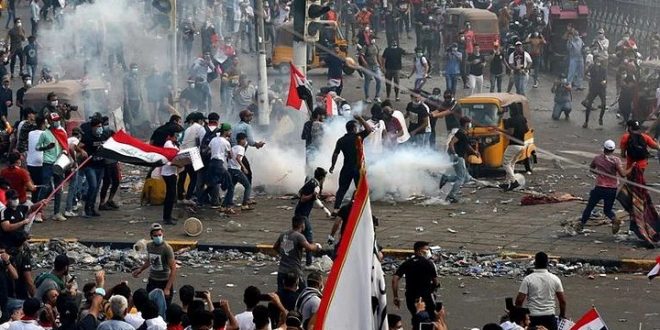30-08-2022
BAGHDAD: Powerful Iraqi leader Muqtada al-Sadr is going on a hunger strike until “violence and the use of weapons” ends, according to an allied legislator.
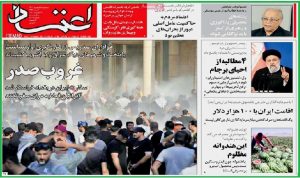 The move came after deadly violence erupted in Iraq’s capital, Baghdad, amid protests by al-Sadr’s followers. At least 30 people have been killed and hundreds more wounded, according to a medical source.
The move came after deadly violence erupted in Iraq’s capital, Baghdad, amid protests by al-Sadr’s followers. At least 30 people have been killed and hundreds more wounded, according to a medical source.
The protests were triggered by al-Sadr’s announcement earlier that he is quitting political life for good and closing his political offices.
Gunfire rang out in the Green Zone of Baghdad after al-Sadr followers converged there and stormed the government palace.
Tensions have soared in Iraq amid a political crisis that has left the country without a new government for 10 months.
Fighting between rival Iraqi forces erupts in Baghdad
As fighting between rival Iraqi forces rages for a second day, Al Jazeera takes a look at some photos that have emerged from Baghdad’s Green Zone where 30 people have been killed.
The violence began after powerful Shia religious leader Muqtada al-Sadr announced on Monday that he would resign from Iraqi politics, prompting hundreds of his angry followers to storm the government palace, sparking clashes with security forces.
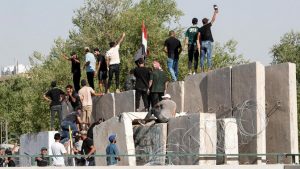 More protesters are joining in the confrontations inside the Green Zone, with no sign of the violence abating, according to media reports.
More protesters are joining in the confrontations inside the Green Zone, with no sign of the violence abating, according to media reports.
“The armed confrontations continue between rival military factions inside the Green Zone,” Abdelwahed said, speaking from Baghdad.
“There is no sign of de-escalation,” he added, as gunfire could be heard behind him. “There have been calls for calm but for the time being, it seems that those calls have not been heard by both rival factions on the ground.”
Abdelwahed said that many people are hoping that the Grand Ayatollah Ali al-Sistani, one of the most influential Shia leaders, will intervene to put an end to this escalation.
A journalist Ali Hashem said the violence reflects the fragmentation in Iraqi politics. And even early elections, as demanded by al-Sadr, might still result in no political party being able to win a majority and form a government.
The violent events of past days might, however, push Iraqi people to get behind a party or a movement in order to bring stability to the country, Hashem said.
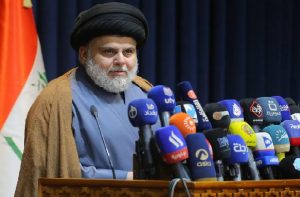 “Maybe with the polarisation today on Iraqi streets people would be anxious to vote, to give the majority to a certain party or a certain alliance in order to end this deadlock,” he said.
“Maybe with the polarisation today on Iraqi streets people would be anxious to vote, to give the majority to a certain party or a certain alliance in order to end this deadlock,” he said.
“Iraq has been witnessing such deadlock for the past, at least the past eight years. Since 2014, in every election, there are a lot of complications related to the way the government is being formed. None of the groups, none of the parties, none of the movements is able to secure a majority,” Hashem said.
“This reflects the fragmentation in the Iraqi political system. The system became dysfunctional. So no one is able to make a decision and this is taking the Iraqis every time to regional factions, to regional players,” he said.
“Any new election in Iraq would maybe prompt people to go to the ballot to vote and to choose an alliance with a majority in order to end this deadlock. But is this possible? This is another question.”
Another journalist Mahmoud Abdelwahed, reporting from Baghdad, said the situation remains extremely tense after a night of armed clashes, which have claimed the lives of 30 people and wounded several hundred, according to medical sources.
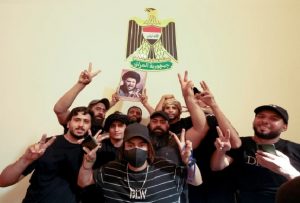 “We have been hearing sounds of gunfire overnight, medium and light weapons have been used, we heard also several explosions inside the Green Zone, the C-RAM air defence system that belongs to the US embassy in the Green Zone was clearly heard early this morning,” Abdelwahed said.
“We have been hearing sounds of gunfire overnight, medium and light weapons have been used, we heard also several explosions inside the Green Zone, the C-RAM air defence system that belongs to the US embassy in the Green Zone was clearly heard early this morning,” Abdelwahed said.
“The situation is very tense and it seems that all efforts to de-escalate have gone to no avail as of yet. There have been calls for the Grand Marji’a, the Grand Shia religious reference in Najaf city to intervene to put an end to this conflict,” he said.
“Many people here believe that since all mediations have failed, since all efforts to de-escalate have not reached a solution yet, then the only way out to put an end to this military confrontation, in their opinion, is the intervention from the Grand Marji’a.”
Tension had been building for months between supporters of al-Sadr and their opponents in the Coordination Framework Alliance, Abdelwahed added.
“This is some sort of climax of 10 months of political disputes between rival politicians over forming a government and during the past months and namely since the withdrawal of Sadr lawmakers from the parliament,” he said.
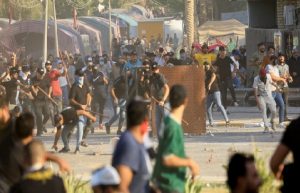 “Things have been escalating and we have been witnessing protests and counter-protests, sit-ins and counter sit-ins.”
“Things have been escalating and we have been witnessing protests and counter-protests, sit-ins and counter sit-ins.”
Baghdad wakes up to intermittent gunfire
Residents of Baghdad woke up to the sounds of intermittent gunfire and explosions after a night of violence in the Iraqi capital, according to an Arabic correspondent in the city.
Iraqi security forces have now forced out al-Sadr supporters from the Republican Palace, where the prime minister’s office is located, as well as the surrounding areas.
A source also told that negotiations are taking place between government officials, and leaders from the Sadrists and their opponents, the Coordination Framework alliance. (Int’l News Desk)
 Pressmediaofindia
Pressmediaofindia
